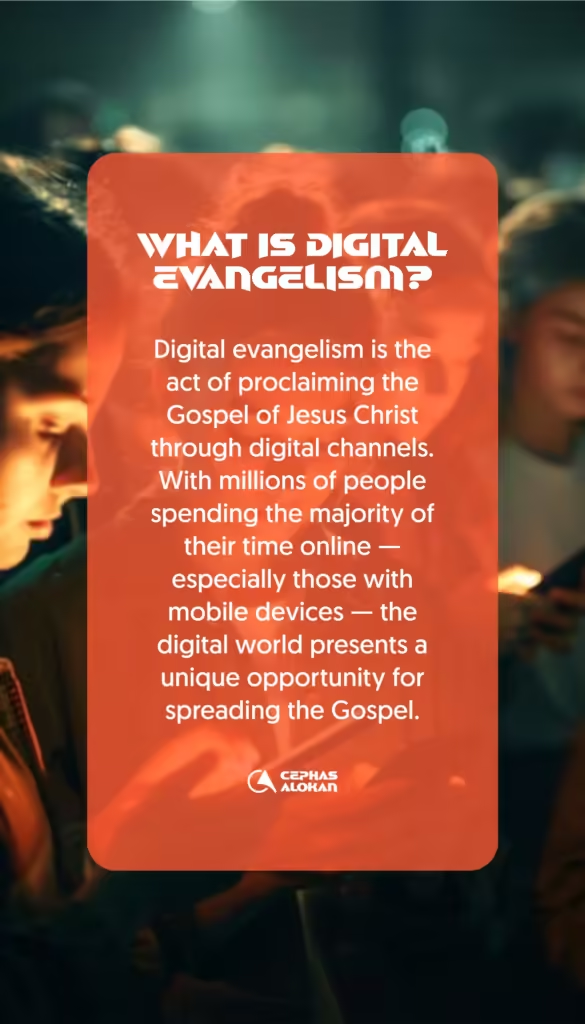Over the years, you may have encountered terms like digital evangelism, internet evangelism, and online evangelism. While these terms may vary, they all refer to the same mission: sharing the Good News of Jesus Christ in the digital space.
What is Digital Evangelism?
Digital evangelism is the act of proclaiming the Gospel of Jesus Christ through digital channels. Today, the world has shifted significantly into the digital world. With millions of people spending the majority of their time online—especially those with mobile devices—the digital world presents a unique opportunity for spreading the Gospel.
Historically, mass media played a crucial role in evangelism. From the days of pioneers like Billy Graham, Archbishop Fulton Sheen, and Pat Robertson to modern figures such as Joel Osteen, mass media has been an effective tool in advancing the message of Christ. However, while traditional mass media remains relevant, the rise of the internet has introduced an even more expansive platform for evangelism: the digital world.

The Foundation of Evangelism
Before digital tools existed, evangelism was primarily face-to-face. In its simplest form, evangelism means sharing the message of Jesus Christ—His death, resurrection, and promise of eternal life. The Apostles set the example, spreading the Gospel through personal encounters, teaching, and discipleship.
Digital evangelism retains the core of this mission but amplifies it using modern technology, including social media, search engines like Google, websites, and various other online platforms.
Also, digital evangelism is a subset of digital ministry, as it primarily focuses on proclaiming the Gospel and reaching new audiences for Christ through digital channels. While evangelism aims to introduce people to Jesus and lead them to salvation, digital ministry encompasses a broader range of activities that include evangelism, discipleship, teaching, counseling, and community building. In essence, digital ministry goes beyond the initial outreach to nurture spiritual growth, support believers in their faith journey, and build digital communities that reflect the heart of traditional ministry.
Ultimately, whether it is through evangelism, discipleship, or service, digital ministry must align with the core values and purpose of ministry itself—to serve God and others by bringing them into deeper relationships with Christ and each other.
Why Digital Evangelism Matters
The digital landscape has transformed communication, making it easier to connect with people across the globe. Today, the digital population exceeds 5 billion people, representing nearly half of the world’s population. As more people gain access to digital tools and innovations, the potential for reaching more individuals with the Gospel continues to grow.
Social media, a significant part of the digital world, is advancing rapidly. New platforms are constantly emerging, while existing ones, such as Facebook, Instagram, and YouTube, are continually evolving. This makes digital evangelism not only accessible but also adaptable to various methods of outreach.
In our previous post on Facebook Evangelism, we explored specific opportunities the digital world offers and how believers can leverage them for spreading the Gospel.
Believers’ Responsibility in Digital Evangelism
As Christians, we have an unprecedented opportunity to reach more people for Christ than ever before. Each time we visit a social media platform, we encounter countless individuals who have not yet heard the Good News.
In Matthew 28:19-20, Jesus gave His followers the Great Commission:
“Therefore, go and make disciples of all nations, baptizing them in the name of the Father and of the Son and of the Holy Spirit, and teaching them to obey everything I have commanded you.”
Mark 16:15 also echoes this instruction:
“Go into all the world and preach the gospel to every creature.”
The digital world is part of that “all the world,” and we are called to bring the message of Jesus to every corner of it.
Debunking Myths About Digital Evangelism
While digital evangelism offers countless opportunities, there are still some common misconceptions that discourage people from engaging in it. Let’s debunk a few of these myths:
- Myth 1: Digital evangelism is not an effective way to share the Gospel.
Reality: Digital evangelism has proven to be an incredibly effective tool, reaching people who may never step foot in a church.
- Myth 2: I need advanced digital skills to participate.
Reality: You don’t need to be a tech expert. Basic digital literacy and a willingness to learn are enough to start.
- Myth 3: The internet is a tool of the enemy.
Reality: While the internet has its challenges, it is also a powerful tool for good, including the spreading of the Gospel.
- Myth 4: Digital evangelism requires significant resources.
Reality: With just a smartphone and access to the internet, you can start sharing the message of Christ.
- Myth 5: Posting on social media is enough for digital evangelism.
Reality: While social media is a great platform, digital evangelism involves intentional outreach and relationship-building beyond just posting updates.
- Myth 6: Digital evangelism will replace traditional evangelism.
Reality: Digital evangelism complements traditional methods, making it possible to reach more people in new ways.
These misconceptions often hold believers back from engaging in digital evangelism, but with the right understanding, anyone can participate.
How to Start Digital Evangelism
There are many methods and strategies for engaging in digital evangelism. Here are six key approaches to get started:
- Social Media Evangelism: Platforms like Facebook, Instagram, and Twitter provide endless opportunities for sharing your testimony, scripture, and the Gospel.
- Blogging Evangelism: Writing faith-based articles and sharing them on your blog or website is a powerful way to spread the message of Christ.
- Video Evangelism: YouTube and other video platforms allow you to create engaging content that shares the Gospel with a global audience.
- Email Evangelism: Sending regular emails to your contacts with encouraging messages, scripture, or Bible study lessons is another way to reach people digitally.
- Podcast Evangelism: Starting a podcast allows you to discuss faith-related topics and reach listeners who prefer audio content.
- Website Evangelism: Creating a website dedicated to sharing the Gospel and offering resources like Bible study guides or devotionals can make a lasting impact.
- Gaming Evangelism: The use of online games as a platform to share the Gospel, building relationships, and discussing Christ. Platforms like Twitch and Christian gaming communities allow for conversations about Jesus in an engaging and interactive space.
- App Evangelism: Creating or promoting mobile apps focused on Bible study, prayer, or faith-based content. App evangelism offers innovative ways to share the Gospel through digital tools people use daily, encouraging spiritual growth and outreach.
Our ministry, CADIM, is committed to helping believers learn how to engage in digital evangelism. We offer workshops, guides, and workbooks to help you get started. For example, our Digital Evangelism workbook is a great resource to kickstart your journey as a digital evangelist.
With this method of doing digital evangelism, there are 3 strategies of digital evangelism
- Personal Digital Evangelism. With this strategy of digital evangelism, you personally pick people up either by direct contact or by your contents and reach out to them for the gospel.
- Group Digital Evangelism. It involves bringing people together with a structured strategy in reaching out to people about Christ. For example, we bring people together under an umbrella and teach them on how preach the Gospel with a systematic guidance
- Organized Digital Evangelism. This is also synonymous to group digital evangelism. It has to deal with churches or ministries who wants their members to partake in evangelism.
Digital evangelism—whether through social media, blogs, or videos—is an effective and necessary method of sharing the Gospel in today’s world. It does not replace traditional evangelism but enhances it, allowing us to fulfill the Great Commission in new ways.
Churches and ministries must embrace the opportunities available in the digital world to spread the Good News of Jesus Christ. Let us take this call seriously and use every available tool to reach the ends of the earth with the message of salvation.







It was worth the read!
Thank you so much for this insightful piece sir.